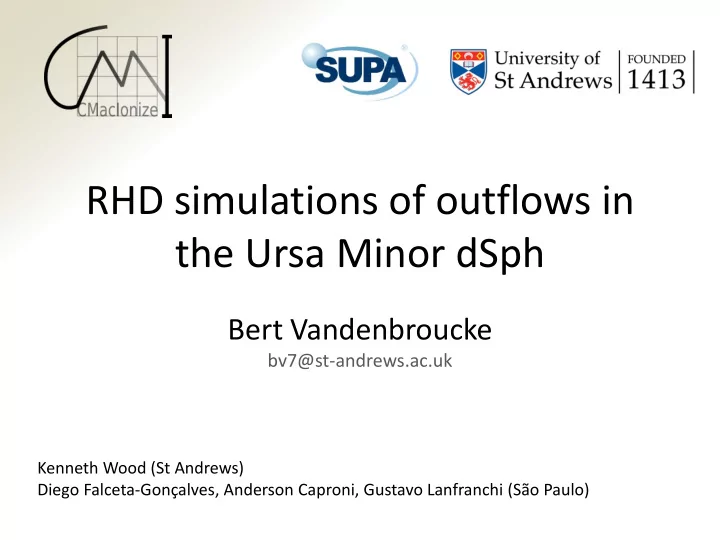

RHD simulations of outflows in the Ursa Minor dSph Bert Vandenbroucke bv7@st-andrews.ac.uk Kenneth Wood (St Andrews) Diego Falceta-Gonçalves, Anderson Caproni, Gustavo Lanfranchi (São Paulo)
Slide 2 of 13 Context: the DIG Vandenbroucke et al. (2018) SILCC post-processing
Slide 3 of 13 RHD DIG Vandenbroucke & Wood, in prep.
Slide 4 of 13 Ursa Minor dSph 𝑁 ℎ ≈ 1.5 × 10 9 M ⊙ 𝑁 𝑐 ≈ 3.0 × 10 8 M ⊙ 𝑒 = 60 ± 10 kpc Milky Way satellite source: Wikipedia
Slide 5 of 13 UMi stellar population Bellazzini+ (2002)
Slide 6 of 13 UMi star formation history Chemical modelling shows a single episode of star formation early on, Δ𝑢 𝑇𝐺 ≈ 3 Gyr Evidence for strong galactic winds that correlate with the SFR or SN rate Lanfranchi & Matteucci (2007)
Slide 7 of 13 SN rate Caproni+ (2017)
Slide 8 of 13 SN driven outflows SN feedback drives significant outflows, but does not completely remove UMi's gas Caproni+ (2017)
Slide 9 of 13 RHD simulations Use the SFH/SN rate to model number and location of UV luminous O/B stars Run self-consistent RHD models including photoionization feedback to test impact of ionizing radiation Pretty much a toy model for galaxy scale RHD Vandenbroucke+ (in prep.)
Slide 10 of 13 Photoionization only Radiation causes moderate outflows Vandenbroucke+ (in prep.)
Slide 11 of 13 SN + radiation SN lead to higher outflow velocities and a more turbulent galaxy structure Effect of SN seems to weaken because of photoionization Vandenbroucke+ (in prep.)
Slide 12 of 13 Caveat Single SN SN in photoionized bubble
Slide 13 of 13 Conclusions (?) • Ursa Minor dSph (UMi) is an interesting toy galaxy because of its known SF/SN history • Self-consistent photoionization models for this galaxy are possible and show (weak) UV- driven outflows • SN + photoionization is very tricky and needs a lot more work before we can trust it
Recommend
More recommend